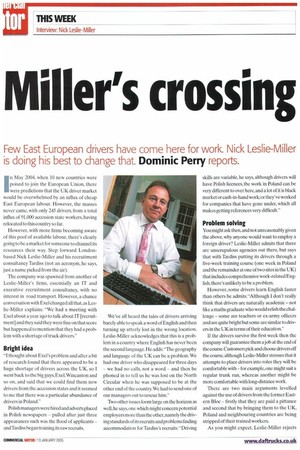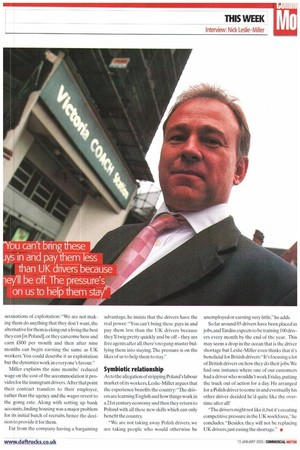ers crossing
Page 20

Page 21

If you've noticed an error in this article please click here to report it so we can fix it.
Few East European drivers have come here for work. Nick Leslie-Miller is doing his best to change that. Dominic Perry reports.
In May 2004, when 10 new countries were poised to join the European Union, there were predictions that the UK driver market would be overwhelmed by an influx of cheap East European labour. However, the masses never came, with only 245 drivers, from a total influx of 91,000 accession state workers, having relocated to this country so far.
However, with more firms becoming aware of this pool of available labour, there's clearly going to be a market for someone to channel its resources their way. Step forward Londonbased Nick Leslie-Miller and his recruitment consultancy Tardiss (not an acronym, he says, just a name picked from the air).
The company was spawned from another of Leslie-Miller's firms, essentially an IT and executive recruitment consultancy, with no interest in road transport. However, a chance conversation with Exel changed all that,as Leslie-Miller explains: "We had a meeting with Exel about a year ago to talk about IT [recruitment] and they said they were fine on that score but happened to mention that they had a problem with a shortage of truck drivers."
Bright idea
"1 thought about Exel's problem and after a bit of research found that there appeared to be a huge shortage of drivers across the UK, so I went back to the big guys. Exel,Wincanton and so on, and said that we could find them new drivers from the accession states and it seemed to me that there was a particular abundance of drivers in Poland."
Polish managers were hired and adverts placed in Polish newspapers — pulled after just three appearances such was the flood of applicants — andTarcliss began training its raw recruits. We've all heard the tales of drivers arriving barely able to speak a word of English and then turning up utterly lost in the wrong location. Leslie-Miller acknowledges that this is a problem in a country where English has never been the second language. He adds: "The geography and language of the UK can be a problem. We had one driver who disappeared for three days — we had no calls, not a word — and then he phoned in to tell us he was lost on the North Circular when he was supposed to be at the other end of the country.We had to send one of our managers out to rescue him."
Two other issues loom large on the horizon as well, he says,one which might concern potential employers more than the other,namely the driving standards of its recruits and problems finding accommodation for Tardiss's recruits: "Driving skills are variable, he says, although drivers will have Polish licences, the work in Poland can be very different to over here, and a lot of it is black market or cash-in-hand work; or they've worked for companies that have gone under, which all makes getting references very difficult"
Problem solving
You might ask then, and not unreasonably given the above, why anyone would want to employ a foreign driver? Leslie-Miller admits that there are unscrupulous agencies out there, but says that with Tardiss putting its drivers through a five-week training course (one week in Poland and the remainder at one of two sites in the UK) that includes comprehensive work-related English, there's unlikely to be a problem.
However, some drivers learn English faster than others he admits: "Although I don't really think that drivers are naturally academic — not like a maths graduate who would relish the challenge — some are teachers or ex-army officers and are quite bright but some are similar to drivers in the UK in terms of their education."
If the drivers survive the first week then the company will guarantee them a job at the end of the course. Customers pick and choose drivers off the course, although Leslie-Miller stresses that it attempts to place drivers into roles they will be comfortable with — for example, one might suit a regular trunk run, whereas another might be more comfortable with long-distance work.
There are two main arguments levelled against the use of drivers from the former Eastern Bloc — firstly that they are paid a pittance and second that by bringing them to the UK, Poland and neighbouring countries are being stripped of their trained workers.
As you might expect, Leslie-Miller rejects accusations of exploitation: "We are not making them do anything that they don't want, the alternative for them is eking out a living the best they can [in Poland], or they can come here and earn £800 per month and then after nine months can begin earning the same as UK workers. You could describe it as exploitation but the dynamics work in everyone's favour."
Miller explains the nine months' reduced wage on the cost of the accommodation it provides for the immigrant drivers. After that point their contract transfers to their employer, rather than the agency and the wages revert to the going rate. Along with setting up bank accounts, finding housing was a major problem for its initial batch of recruits, hence the decision to provide it for them.
Far from the company having a bargaining advantage, he insists that the drivers have the real power: "You can't bring these guys in and pay them less than the UK drivers because they'll twig pretty quickly and be off— they are free agents after all, there's no gang-master bullying them into staying. The pressure is on the likes of us to help them to stay."
Symbiotic relationship
As to the allegation of stripping Poland's labour market of its workers, Leslie-Miller argues that the experience benefits the country: "The drivers are learning English and how things work in a 21st century economy and then they return to Poland with all these new skills which can only benefit the country.
"We are not taking away Polish drivers, we are taking people who would otherwise be unemployed or earning very little," he adds.
So far around 85 drivers have been placed in jobs, andTardiss expects to be training 100 drivers every month by the end of the year. This may seem a drop in the ocean that is the driver shortage but Leslie-Miller even thinks that it's beneficial for British drivers: "It's focusing a lot of British drivers on how they do their jobs. We had one instance where one of our customers had a driver who wouldn't work Friday. putting the truck out of action for a day. He arranged for a Polish driver to come in and eventually his other driver decided he'd quite like the overtime after all!
-The drivers might not like it, but it's creating competitive pressure in the UK workforce," he concludes. "Besides, they will not be replacing UK drivers,just easing the shortage.•






















































































































































































